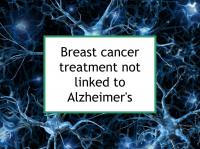Concerns have been raised as to whether the mostly temporary cognitive impairment (chemo brain) caused by breast cancer treatments in some women prepares the ground for Alzheimer's and other forms of dementia in later life. Chemo brain is most well known to be caused by doxorubicin chemotherapy. Now a new study has reported that Alzheimer's disease is actually slightly less prevalent among breast cancer survivors.
Chemo brain and breast cancer
Chemo brain is most commonly known as a side effect of anthracycline chemotherapy, but has also been reported as a result of aromatase inhibitor and tamoxifen treatments. Although the evidence is mixed, findings to date suggests that chemotherapy-induced chemo brain does not lead directly to Alzheimer's disease in old age.
Chemo brain includes reduced verbal ability, slowed cognitive processing speed, impaired executive functioning, and reduced psychomotor processing speed. Executive functioning refers to the ability to organize thoughts and prioritize tasks, manage time well, make plans, and adapt to changing situations. Processing speed refers to the ability to automatically and fluently perform relatively easy or routine cognitive tasks. Psychomotor processing speed refers to reaction time when a physical task is involved.
Latest research finds lower Alzheimer's risk
The large retrospective study referenced above was designed to investigate the risk of Alzheimer's dementia among breast cancer survivors compared with cancer-free controls. The potential associations of various cancer treatments with Alzheimer's risk was also assessed.
To conduct the study, the authors used data from the Korean National Health Insurance Service. The study included 70,701 patients who underwent breast cancer surgery between 2010 and 2016 and were matched 1:3 with cancer-free controls. Participants had mean age of 53 years and were followed for a median of 7.3 years. Data was collected concerning breast cancer diagnosis, surgery, and additional treatments, as well as confounding factors. Results were adjusted for variables such as diabetes, alcohol consumption, and level of physical activity.
A total of 1,229 cases of Alzheimer's dementia were diagnosed among the 70,701 breast cancer survivors during the study period. Survivors were found to experience 8% lower risk of Alzheimer's compared to the cancer-free controls. However, further analysis determined that this lower risk did not persist beyond the first five years of survival.
Anthracycline (doxorubicin, epirubicin) use was not found to be associated with risk of Alzheimer's. There was also no association of trastuzumab (Herceptin), taxanes (paclitaxel, docetaxel), or endocrine therapy (including aromatase inhibitor, tamoxifen only or combined tamoxifen and aromatase inhibitor) with Alzheimer's.
However, radiation treatment was found to be associated with 23% lower risk of Alzheimer's among survivors. A total of 50,681 (72%) of the breast cancer survivors underwent radiation treatment. The authors note that unintended radiation doses to the brain from radiotherapy could account for this result. It has previously been reported that such low dose brain irradiation has resulted in temporary improvements in cognitive function. Low-dose radiation appears to have anti-inflammatory and neuroprotective effects.
The authors comment that, notwithstanding common concerns about cognitive decline after treatment, a lower risk of Alzheimer's dementia was found in the breast cancer survivors than the cancer-free controls in this study population. Further research is required to evaluate the long-term risk of Alzheimer's dementia in this population.
Please see our article on chemo brain for more information.
